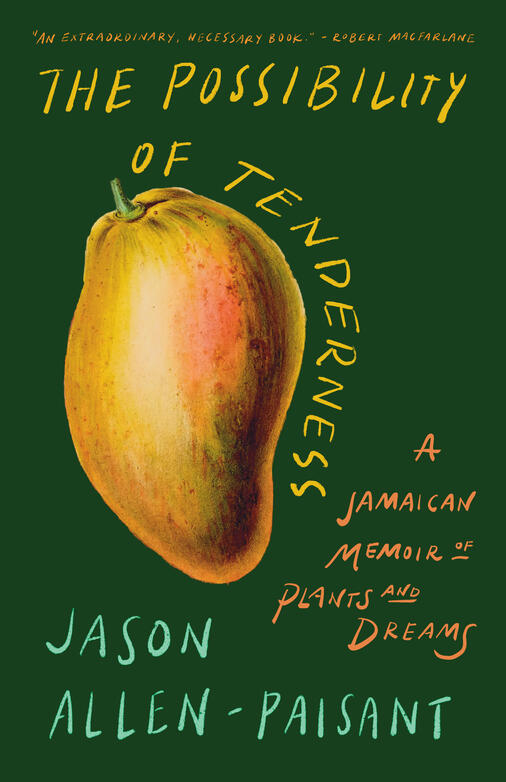
The Possibility of Tenderness is a personal history narrated through the lens of the ‘grung’ and plants. It’s also a people’s history of the land, a family saga, an archival detective story through time.
At the heart of The Possibility of Tenderness is a poetic and deeply personal search for peace and belonging in Britain—a country far from, yet inextricably intertwined with, Jason Allen-Paisant’s homeland of Jamaica. As Jason asks, “How do Black people find tenderness while being threatened in the world? How do we find tenderness while fighting to preserve our bodies? This is what this journey is about.”
Rooted in the soil, Jason seeks answers through his connection to the land: “The plants I speak about, the people I portrait, the stories I tell about the land are my ways into describing a new form of living while Black in a country like Britain.” The book is a love letter to his rural Jamaican birthplace as Jason discovers what the village can teach us about leisure and living well—lessons that resonate far beyond national borders.
For US readers, The Possibility of Tenderness holds particular relevance as it grapples with universal questions of migration, intersections of race, class, and nature, and the pursuit of dignity within systems of inequality. Jason’s reflections echo the struggles of many within the United States as he explores what it means to carry a history of displacement while imagining pathways to joy and freedom.
Part memoir, part artist’s novel, this book bridges conversations about the global Black diaspora, and with its echoes of Edouard Louis’ work on class and mobility, it challenges all of us to reimagine what it means to thrive in a fractured world.
***
Having engaged with audiences around the world in the wake of the launch of The Possibility of Tenderness, the author provides some insight into the various ways that readers are connecting with the work:
- Black masculinity and vulnerability – Many readers find themselves moved by how the book reimagines and complicates traditional narratives around Black masculinity, foregrounding tenderness, reflection, and emotional depth.
- The relationship between land and identity – The book’s sensuous engagement with landscape—Jamaica, in particular—offers readers a way of thinking about how geography shapes inner life and memory.
- Diaspora and belonging – In the events I’ve done so far, many readers from the Caribbean or wider diaspora, are finding that the book’s reflections on home, displacement, and cultural inheritance are speaking to their own fractured or layered identities.
- Fatherhood and intergenerational connection – The presence or absence of the father, and the exploration of paternal lineage, resonates with both male and female readers (across generations), touched and shaped by this familiar and familial legacy and its emotional inheritance. They talk about how this book moves from pain to shape its own mythology of the self.
- The lyric form itself – Lovers of poetry and hybrid prose connect with how the book stretches the boundaries of genre, using form to echo the emotional cadences of tenderness and memory.
- Postcolonial and decolonial perspectives – Some readers engage with the book through its subtle engagement with the legacies of colonialism, particularly how they inflect language, land, and self-perception.
- Queerness and sensuality – Even if not explicitly framed as a queer text, the attention to touch, perception, and intimacy has resonated with queer readers who recognize the importance of softness as resistance.
***
Read the Q&A with Milkweed Editions here: https://milkweed.org/blog/the-possibility-of-tenderness-author-qa-with-jason-allen-paisant
Read the Oxford Review of Books review here: https://www.the-orb.org/post/re-rooting